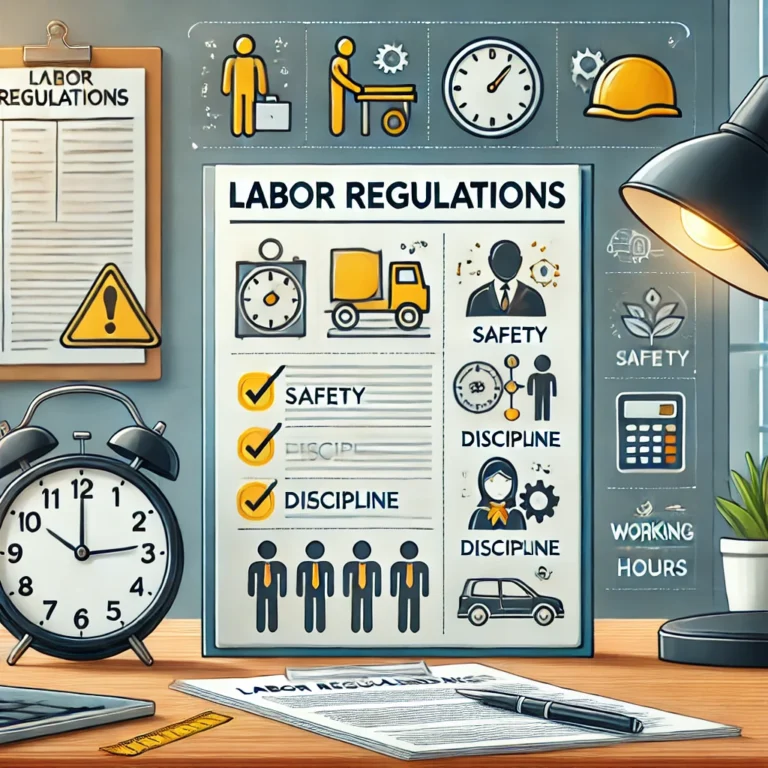Call us now:
Forms of Disciplinary Actions According to Vietnamese Law. Principles and Statute of Limitations for Disciplinary Actions According to Vietnamese Labor Law.

Forms of Disciplinary Actions According to Vietnamese Law
According to the 2019 Labor Code, the forms of disciplinary actions applied to employees who violate labor rules are specifically regulated as follows:
1. Reprimand
Reprimand is the lightest form of discipline, applied to minor, non-serious violations. This serves as a reminder to the employee about their behavior. It is usually issued in writing, clearly stating the violation and reminding the employee to adhere to workplace rules.
2. Deferral of Wage Increase for up to 6 Months
This form of discipline applies to moderate violations, where the employee needs a more severe penalty to prevent repeat offenses. The employee’s wage increase is deferred for a maximum of 6 months. This decision must be documented in writing, specifying the reason and the exact period of wage increase deferral.
3. Demotion
Demotion is applied to employees in managerial or leadership positions who commit serious violations of labor regulations or legal provisions related to their duties and responsibilities. The employee will be removed from their current position. This disciplinary action must be decided in writing and notified to the employee.
4. Dismissal
Dismissal is the most severe form of disciplinary action, applied when an employee commits particularly serious violations, repeatedly violates labor regulations, or reoffends during a disciplinary period. Acts that may lead to dismissal include:
- The employee is absent for 5 cumulative days within 30 days or 20 cumulative days within 365 days without a valid reason.
- The employee engages in theft, embezzlement, gambling, intentional injury, or drug use at the workplace.
- The employee discloses trade secrets, technological secrets, or engages in other acts that cause serious damage to the employer’s interests or commits sexual harassment in the workplace.
- The employee has already been disciplined with a wage increase deferral or demotion and reoffends before the disciplinary record is cleared.
Principles of Labor Discipline Actions in Vietnam
The principles of labor discipline handling are fundamental regulations that employers must follow when disciplining employees. These principles ensure legality, fairness, and transparency in the disciplinary process. Below are the principles of labor discipline handling according to the 2019 Labor Code:
1. Proving the Employee’s Violation
The employer must have clear evidence proving that the employee violated workplace regulations or the terms of the labor contract. This ensures that all disciplinary decisions are based on solid and fair grounds.
2. Participation of the Employee’s Representative Organization
The disciplinary process must include the participation of the employee’s representative organization at the workplace. The role of this organization is to supervise and protect the rights of the employee throughout the disciplinary process.
3. The Employee’s Right to Self-Defense
The employee has the right to participate in the disciplinary meeting to defend themselves or seek support from a lawyer or the employee representative organization. In cases where the employee is under 15 years old, their legal representative must be present to protect their legal rights.
4. Documenting the Disciplinary Meeting
Every disciplinary process must be documented, detailing the proceedings and decisions of the meeting. This record serves as official proof that the disciplinary process was carried out in accordance with the regulations.
5. One Disciplinary Action for Each Violation
For each violation, only one form of disciplinary action may be applied. This ensures that employees are not punished multiple times for the same offense, protecting them from unreasonable disciplinary measures.
6. Handling Multiple Violations
When an employee has committed multiple violations, the employer will apply the highest form of discipline for the most serious violation.
7. Disciplinary Actions Must Be Taken Within the Statute of Limitations
Disciplinary actions must be carried out within the timeframe specified by law, known as the statute of limitations for disciplinary actions. This timeframe is the period during which the employer has the right to take disciplinary measures against the employee’s violation. Adhering to this statute is crucial, as once it expires, the employer loses the right to discipline the employee for that violation.
Statute of Limitations for Labor Disciplinary Actions
The statute of limitations for labor disciplinary actions is the period during which the employer has the right to discipline an employee for a violation. If this period expires, the employer is no longer allowed to discipline the employee for that violation. According to the 2019 Labor Code, the statute of limitations for labor disciplinary actions is specifically defined as follows:
Statute of Limitations for Labor Disciplinary Actions
For ordinary violations: The statute of limitations is 6 months from the date the violation occurred.
For violations directly related to finance, assets, disclosure of trade secrets, or technological secrets: The statute of limitations is 12 months from the date the violation occurred.
If the statute of limitations expires and the employer has not initiated disciplinary actions, the employer cannot discipline the employee for that violation. Employers must track and manage the timeline for handling disciplinary matters to avoid exceeding the statute of limitations and to ensure the disciplinary process is conducted in accordance with legal regulations.
Cases of Suspension of Labor Discipline Actions
Labor discipline handling will be suspended in the following cases: when the employee is on sick leave or on approved leave by the employer; when a female employee is pregnant, on maternity leave, or caring for a child under 12 months old; when the employee is in custody, detention, or waiting for the results of an investigation by competent authorities. If the employer takes disciplinary action during these periods, the disciplinary decision will be considered a violation.
Once the reasons for the suspension of disciplinary action end, if the statute of limitations for discipline has expired or if the remaining statute of limitations is less than 60 days, the period for disciplinary handling may be extended. Specifically, the statute of limitations can be extended for up to 60 days from the date the suspension period ends. This means that after the employee returns to work or the special conditions conclude, the employer has an additional 60 days to handle the employee’s violation.
For example, if an employee violates company regulations but takes long-term sick leave immediately afterward, according to Clause 4, Article 122 of the Labor Code, disciplinary action cannot be taken during the sick leave. When the employee returns to work, if the statute of limitations has expired or if less than 60 days remain, the employer can extend the period for disciplinary action by up to 60 days to complete the necessary procedures.
This provision ensures that the employer still has the opportunity to address employee violations fairly, even if the disciplinary process is interrupted due to objective conditions. However, this extension must comply with the maximum 60-day period from the end of the reason for the suspension of disciplinary action.
Contact Us Now:
DCNH LAW
Address: 38B Tran Nhat Duat, Phuoc Hoa ward, Nha Trang city, Khanh Hoa province, Vietnam.
Phone: (+84) 343320223 – 974278893
Email: dcnh.law@gmail.com



